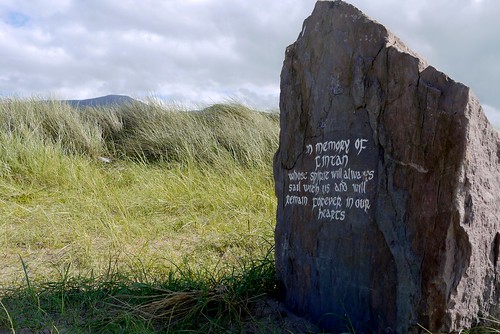In our garden this morning.
Daily Archives: July 3, 2011
Twain’s attic
This is getting ridiculous — two terrific book reviews in one weekend. First Mary Beard’s dissection of Robert Hughes’s Rome. Now Michael Lewis on The Autobiography of Mark Twain, Vol. 1.
At the very least, great writers are supposed to think that writing is an important, if not a sacred, activity. When Twain set out to write the story of his life, he found the written word wanting (“too literary”), and elected instead to dictate it. The book in question has been advertised and sold as the autobiography that Mark Twain wrote and declined to publish in his lifetime because the material was simply too shockingly honest. There are enough hoaxes in this claim to make Tom Sawyer blush. Twain didn’t write it; hardly any of it is shockingly honest; just about all the material in it has seen print in one form or another, either in biographies of Twain or in Twain’s own magazine work. The book weighs in at 736 pages printed in a microscopic font, which gives it the feel of a serious and deeply felt venture. For its editors, it clearly was; but for Twain, I’m not so sure.
Twain’s dictations make up only about one-third of the book; the rest is excerpts from newspaper articles that Twain found interesting, transcripts of Twain’s after-dinner speeches, end notes, footnotes, notes on the text, explanatory notes, and so on. Even the putatively autobiographical bits are less autobiography than an elaborate exercise by an extremely crafty writer to avoid writing his autobiography. It is impossible to imagine anyone who isn’t being paid to do it reading the thing from start to finish. Even I, who still hope to be paid, hauled the book around for six months on business trips and vacations, and spent vast amounts of time staring at Twain’s random ramblings in minuscule type feeling resentful and vaguely duped—roughly the way I felt a dozen pages into the Personal Recollections of Joan of Arc-before I could summon the energy to wade deeply into it.
But taken for what it is, rather than what it pretends to be, the book is great. What we have here amounts to the contents of Mark Twain’s attic: all the stuff that didn’t fit in the living quarters and that the man tossed upstairs, where for a century it gathered dust, cobwebs, and rumors. A team of editors at the University of California, Berkeley, moved by a passion for accuracy wholly alien to their subject, went to work on this mess and have rendered it, if not comprehensible, at least inspectable. Here is the headline: if you thought Mark Twain’s character improbable for a Great Writer, wait until you see what he left in the boxes upstairs. Or, to put it another way: if all you knew of Mark Twain was this curious self-presentation, you would never believe that any grown-up person would be interested in his literary output a century after his death…
It’s a very good, perceptive review which fastens unerringly on the way Twain, like all celebrities, became trapped by his public persona.
Writing with one eye on the audience is certainly a handicap; but the worry that the audience might rise and leave the auditorium at any moment pushes the writer to be clear, and brief, and obviously worth listening to. He is forced to pay special attention to the sound of his words. A distinctive literary voice is a bit like a talent for wiggling your ears, or for holding your breath underwater for two straight minutes. It’s not fair that some people simply sound particularly themselves and others do not, and it’s really not fair just how particularly himself Twain sounded, even when he lay in bed and rambled to a stenographer. But Twain’s voice is the reason people still read him. His voice is the reason you feel as if he is talking to you. And the crowds he played to in his lust for fame and fortune helped him to create that voice.
On the other hand, it takes a lot of effort to sustain a voice without becoming trapped by it. Not long before he committed suicide, I met Hunter S. Thompson at his home, late one night. He sat in a kitchen pulling on a half gallon of tequila straight from the bottle, surrounded by giant placards inscribed with various outrageous things that he had said or written. He had become less a writer than an actor trying not to forget the character he was meant to be playing. By the end of his life Twain was obviously grappling with this problem, too.
In Memoriam
Walking on a remote beach in Kerry on Thursday last, we came on this touching memorial stone. It’s a beach that is famous for treacherous offshore tides, so perhaps that explains what happened.
.XXX marks the spot where the dot con boom begins
This morning’s Observer column about ICANN’s decision to allow new generic Top-Level Domains (gTLDs).
Given the pressure on namespace within the existing gTLDs, it was inevitable that Icann would come under pressure to expand their number. The first foray came from those who wanted to establish “.xxx” as cyberspace’s red-light district. After numerous spluttering rows, this was finally approved a few months ago. You may be reassured to know that applicants for a .xxx domain must first complete an application process that will be overseen by the International Foundation for Online Responsibility (Iffor), a body set up to “promote the development of responsible business practices and conduct within the online adult-entertainment community”. So that’s all right, then.
But the .xxx stuff was really just the overture to the main business, which is accommodating the needs of corporations. Icann has now announced that it will allow them to apply for new gTLDs, such as “.fashion” or “.drinks”, for example. Or perhaps even “.coke” (though cocaine dealers might have something to say about that)…
In a thoughtful comment on the piece, Anthony Van Couvering argues that I’ve allowed my conspiracy theorising to get the better of my judgement.
The big-corporation conspiracy theory is one that I typically warm to, but as someone who’s been involved with ICANN for years, I can tell you that far from big corporations pushing this, they have been dead set against it, and over the last few years have put a lot of dollars and muscle trying to defeat the expansion of the top-level domain space. The reason is twofold: first, they feel that they will have to do defensive registrations in hundreds of new namespaces; second, they already own most of the beachfront property, and if you’re in that position, the last thing you want are more beaches.
He goes on to say that:
So although it does function as a barrier to entry, the $185,000 application fee is probably not what’s going to stop someone who’s seriously interested in applying — it’s just one of many expenses.
So who will apply? The brands will apply, mostly for .brand, either to promote it or as a “just in case” defensive measure. Cities will apply, and both New York and Paris among others have made known their intent. Ethnolinguistic communities will apply: .scot (Scotland), .cymru (Wales), .bzh (Brittany), and .eus (Basque) are just some of the announced candidates. Finally, there will be entrepreneurs who think that they have some special sauce that will make their top-level domain one that will be attractive to consumers.
[…]
The new gTLD program has a complicated history, and many interests have forcefully put forward their agenda. What we finally got was a compromise that everyone can grudgingly live with, but which in the end opens up the top-level domain space that for years had been blocked by corporate interests. It is a Very Good Thing.
I hope he’s right.


